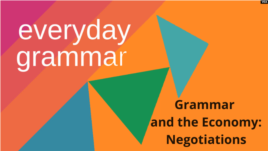22 June 2023
Imagine you are shopping at a market. Perhaps you are in a situation in which you need to negotiate a price. How do you do so?
In today's Everyday Grammar, we will explore a point of connection between grammar and the economy. You will learn about some of the terms and structures we use to reach agreement on prices.
Asking about a price

In an earlier Everyday Grammar, we explored questions about prices. We discussed the term "how much" and explained why it is central to talking about prices.
When we negotiate prices, we have a few more important elements. Of special importance are the words "this" or "that" -- and their related plural forms "these" and "those."
In some cases, we use "this" or "that" as pronouns – meaning they take the place of nouns.
We use "this" if the item or object is close to you.
We use "that" if the item or object is at a distance or farther away.
"These" is the plural form of "this."
"Those" is the plural form of "that."
When you use "this" and "that" as pronouns, you might also need to point with your finger. The reason we point is because "this" and "that" can be unclear to the listener. But when you point with a finger – or pick up an object – the listener will understand what you are talking about.
The advantage of using "this" and "that" is that it allows you to ask about an object even if you do not know the name for it.
As a result, you might feel more confident in your speaking.
Let's explore an example. Imagine you are at a market and you pick up an object. A discussion might go like this:
Buyer: How much is this?
Seller: 20 dollars.
Our question involves "how much," the verb BE, and "this," a pronoun.
Negotiation
So, we have our basic ingredients. How might a further discussion about price go?
Buyer: How much is this?
Seller: 20 dollars.
Buyer: Would you take 15?
Seller: I would take 17 for it.
Buyer: Ok, that works.
Notice that our buyer asked the question "Would you take 15?"
This question involves the modal "would" along with the main verb "take." The speaker used "15" in place of "15 dollars."
Notice that the seller uses the modal "would" in the response:
"Person: I would take 17 for it."
So, we have the modal "would" and the main verb "take" playing important parts in our price discussions. But there are other ways that price discussions take place. We could propose a different price in a negotiation by using the phrase "How about...."
Let's listen to how this might sound:
Person 1: How much is this?
Person 2: 20 dollars.
Person 1: Would you take 15?
Person: How about 17.
Person 1: Ok, sounds good.
"How about 17" is called a fragment because it is not a complete sentence.
The fragment "how about 17" suggests something like the following language: "How about you pay me 17 dollars."
But instead of using a full sentence, speakers often use a shortened version. This is how we arrive at "How about 17."
Practice
Let's take some time to work with these ideas.
Ask about the price of a pair of shoes that are near to you.
Pause the audio to consider your answer.
Here is one possible answer:
How much are these?
The reason we used "these" is because we are talking about a pair of shoes - not one shoe. As a result, we use a plural form of the verb BE as well.
Now imagine that the discussion continues.
How much are these?
Ten dollars.
How might you negotiate a lower price?
Pause the audio to consider your answer.
Here are a couple possible answers.
You might say
"Would you take 8?"
Or
"How about 8?"
There are, of course, other ways to ask about lowering the price. But "Would you take...?" and "How about...." are two nice possibilities.
Closing Thoughts
Today we explored a few ways to negotiate a price. There are, of course, many other ways to do so.
In future lessons, we will explore negotiations in greater detail – as well as many other fun, useful grammar issues that connect with everyday life.
I'm John Russell.
John Russell wrote this lesson for VOA Learning English.
_______________________________________________________________
Words in This Story
modal – n. a verb (such as would) that is usually used with another verb to express ideas such as possibility, necessity, etc.